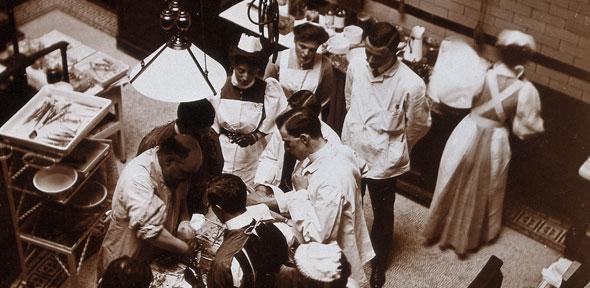
Students taking NST Part II Biological and Biomedical Sciences can now choose History and Philosophy of Science and Medicine (HPSM) as their Major Subject.
Alternatively, BBS students can choose one of three HPSM papers as their Minor Subject.
Why History and Philosophy of Science and Medicine?
HPSM enables students to ask critical questions about science, medicine and technology and their place in society. Why do people believe what physicians, engineers or scientists say? Is science universally true, or has it developed in different ways in different cultures? How can we manage the ethical problems raised by scientific discovery, medical enterprise and technological change?
Our courses offer a great way to develop skills in writing, sifting evidence and presenting arguments. Students can follow their interests across a variety of disciplines, historical periods and different parts of the world. They can explore the history of the fields they study and explore ethical questions related to them. New perspectives on these subjects are vital at a moment when social and biomedical transformations pose major challenges, and the authority of experts is increasingly questioned.
Major Subject: History and Philosophy of Science and Medicine
Students choosing the HPSM Major Subject take all four of the following papers. They also take one Minor Subject selected from another area of BBS. They write a 6,000-word dissertation in either HPSM or their Minor Subject.
Early Medicine
Why did early modern practitioners consult the stars for a cure and recommend powdered excrement to heal bloodshot eyes? This paper explains how such practices once made perfect sense, and examines medical knowledge across the globe in the medieval and early modern periods. What was the role of experiments five hundred years ago? How did people theorize sexual difference? How did patients and practitioners negotiate a cure that was affordable and effective? This paper asks fundamental questions about the historical development of medicine and healing.
Modern Medicine and Biomedical Sciences
Born in hospitals, vaccinated, X-rayed, taking antibiotics, receiving transplants – medicine sets the parameters of our lives. Since a great deal of biology, chemistry and physics has been and continues to be done as part of medicine, it is also central to HPS. This paper is about how, and with what consequences, a new, scientific medicine was made for the modern world.
Philosophy of Science and Medicine
This paper provides students with the conceptual tools to explore the epistemological challenges which arise in pursuing medical research. The core lecture series explores some of the philosophical issues which arise in medical research, ranging from the definition of health to the strengths and limitations of Evidence Based Medicine. This close focus is supplemented with study of philosophical issues in neighbouring scientific disciplines, and with a broader grounding in core concepts in the philosophy of science. Students who take this course will gain a unique insight into how medical science relates to other sciences, its strengths and its limitations.
Ethics of Medicine
This course provides students with the opportunity to explore core concepts in medical ethics and bio-ethics, ranging from the ethics of reproduction to resource allocation. It also provides an introduction to some of the broader social and political forces which shape the provision of care, and provides tools for thinking about how these forces might influence not only the use but the production of medical knowledge. This course provides students for thinking critically about the challenges medicine raises for society, and the ways in which society structures medicine.
Minor Subject options
Students choosing their Major Subject from another area of BBS can take one of the following papers as their Minor Subject (but there are some restrictions on the combinations of subjects that are permitted). Their dissertation can be in either their Major Subject or their HPSM Minor Subject.
Early Medicine (Paper 113)
See above.
Modern Medicine and Biomedical Sciences (Paper 114)
See above.
Philosophy and Ethics of Medicine (Paper 107)
Do we have a human right to health? What is it to be healthy anyway, and can good health be measured? How can we know that smoking causes lung cancer, rather than that they are merely correlated? Is it ethical to experiment on humans to gain that knowledge? Is the foetus a person, and does this affect the morality of abortion? How should we decide between funding basic science and applied studies? Medical practice raises significant philosophical, ethical and political questions. This course studies these questions and shows how different answers may influence practice.
Philosophy and Ethics of Medicine is only available as a Minor Subject, but all of the material covered by this paper also features in the HPSM Major Subject.
Careers
The skills acquired in History and Philosophy of Science and Medicine are valuable for a range of careers. Medical ethics, bioethics and the history of medicine and health are very helpful in particular for future doctors and vets, giving them an understanding of the wider scope of their professions, its transformation, and place in society. At a time when medicine, biology, technology and the demographics of our society are undergoing major transformations, HPSM helps you to see the bigger picture.
Main image: Charing Cross Hospital, London, 1900
Image credit: Wellcome Collection
